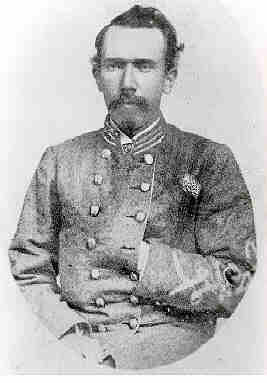Pinckney Downie Bowles facts for kids
Quick facts for kids
Pinckney Downie Bowles
|
|
|---|---|
 |
|
| Born | July 17, 1835 Edgefield County, South Carolina |
| Died | July 25, 1910 (aged 75) Tampa, Florida |
| Buried |
Old Historical Cemetery
Evergreen, Conecuh County, Alabama |
| Allegiance | |
| Service/ |
|
| Years of service | 1861-1865 |
| Rank | |
| Unit | |
| Battles/wars | American Civil War |
| Spouse(s) | Alice Irene Stearns Bowles |
Pinckney Downie Bowles (born July 17, 1835 – died July 25, 1910) was an American lawyer and judge. He also served as a military officer for the Confederate States Army during the American Civil War.
Contents
Early Life and Education
Pinckney D. Bowles was born in Edgefield County, South Carolina. His family owned a large plantation. He went to the South Carolina Military Academy in Charleston, South Carolina. This school is now known as The Citadel. He also studied at the University of Virginia.
After college, he studied law with Samuel McGowan in Abbeville, South Carolina. In 1859, Bowles moved to Alabama. He started his law practice in Conecuh County.
Military Service During the Civil War
In 1860, Bowles joined the state militia. He became a colonel in the 28th Alabama Militia. He also served as a first lieutenant in a local group called the Conecuh Guards. When the Civil War began, he was promoted to captain of this group.
Bowles and his men were first sent to Florida. Then they moved to Virginia. There, they joined a large group of soldiers called the Army of Northern Virginia.
Promotions and Key Battles
On May 2, 1861, Bowles was at Yorktown, Virginia. He was re-elected as a captain in the 4th Alabama Infantry Regiment. He fought in the Seven Days Battles in June and July 1862. These battles happened near Richmond, Virginia. They were a big challenge for the Union troops. The Union Army was trying to capture the capital of the Confederacy.
In August 1862, Bowles was promoted to major. This was just before the Second Battle of Bull Run. He became a lieutenant colonel after the Maryland Campaign. A few days later, he was promoted to colonel.
Family Life During the War
Pinckney Bowles got married during the Civil War. He married Alice Irene Stearns on February 24, 1863, in Sparta, Alabama. Alice was the daughter of Judge N. F. and Anna C. Stearns. They had three children together: Catherine, Mary Ella, and Minnalula.
Leading the 4th Alabama
Colonel Bowles led the 4th Alabama in many important battles. These included the Fredericksburg, Chancellorsville, and much of the Gettysburg Campaign. He also led them during the Overland Campaign in 1864.
From June to September 1864, he commanded Law's Brigade. This was while General Law was recovering from injuries. In the last months of the war, Bowles led a brigade of five regiments. Some records say he was made a brigadier general on April 2, 1865. However, there is no official record of this promotion.
Even though he was in many fierce fights, Bowles was never wounded. A bullet once shattered his canteen at the First Battle of Bull Run. His cap was also shot off his hand at the Battle of Spotsylvania.
Life After the War
After the Civil War ended, Bowles went back home. He continued to practice law in Sparta, Alabama. Later, he moved to Evergreen, Alabama. This happened when the county seat moved there.
For ten years, from 1867 to 1877, he worked as the county prosecutor. After that, he focused only on his private law practice. His business did very well. Bowles became one of the top lawyers in southern Alabama.
He was also active in his community. He was part of the Episcopalian Church. He was also involved with the Democratic Party and the Freemasons. He held a "general" title in the United Confederate Veterans group. From 1887 to 1898, he served as a probate judge. A probate judge handles things like wills and estates.
Pinckney Downie Bowles died in Tampa, Florida. He is buried in the Old Historical Cemetery in Evergreen, Alabama.
 | Percy Lavon Julian |
 | Katherine Johnson |
 | George Washington Carver |
 | Annie Easley |

